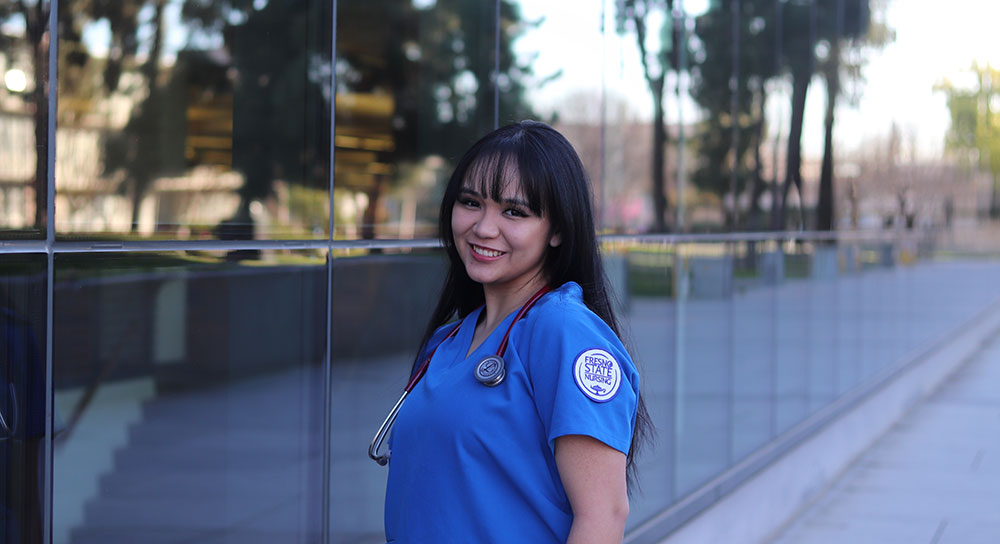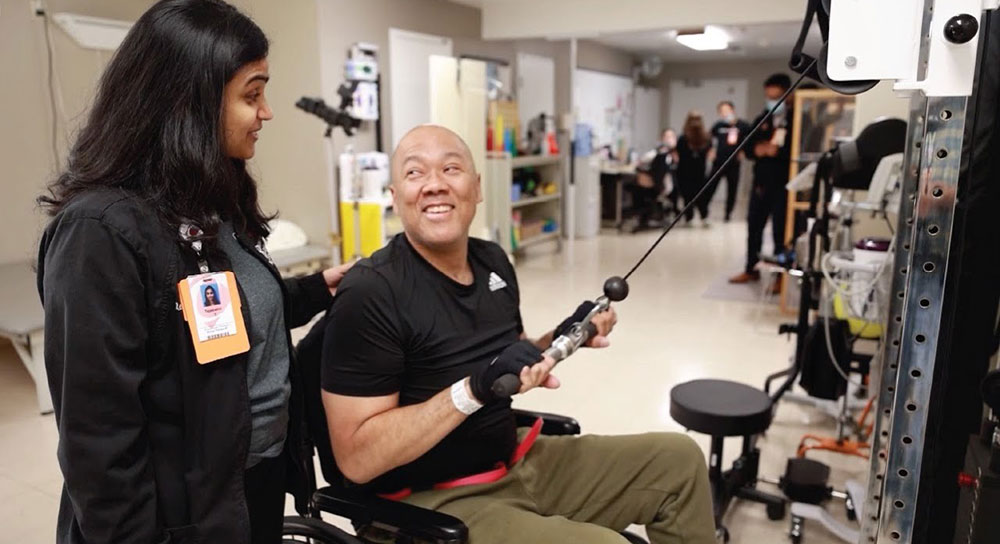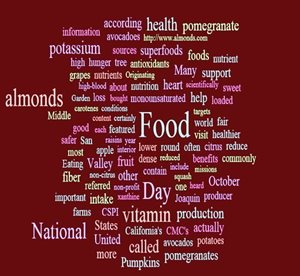 National Food Day was started in 2011 with five priorities: promote safer, healthier diets; support sustainable and organic farms; reduce hunger; reform factory farms to protect the environment and animals; support fair working conditions for food and farm workers. Throughout the nation, as many as 8,000 events are planned on and around this day each October – including at Community’s hospitals.
National Food Day was started in 2011 with five priorities: promote safer, healthier diets; support sustainable and organic farms; reduce hunger; reform factory farms to protect the environment and animals; support fair working conditions for food and farm workers. Throughout the nation, as many as 8,000 events are planned on and around this day each October – including at Community’s hospitals.This year’s Food Day is being sponsored by Practice Greenhealth which includes the Healthier Hospitals program that Community is a participating member of. Our National Food Day Committee has worked very creatively to bring you an action-packed, fun, and mouth-watering event this year. There will be a game to learn honey bee information, a quiz with prizes, and a celebration of healthy, seasonal, locally-grown foods featured as smoothies, infused water and other surprises. Come and join us at one of these celebrations:
- Clovis Community Medical Center’s The Grove Café: 11 am - 2 pm
- Community Regional Medical Center’s cafeteria: 11 am - 2 pm
- Fresno Heart & Surgical Hospital’s Café: 11 am - 2 pm
- Community Behavioral Health Center Classroom: 11 am - 1 pm
- Community Subacute & Transitional Care Center Classroom: 11 am - 1 pm
This year we’re celebrating the role that California’s abundant agriculture production – and especially our region – plays in feeding the rest of the country. Did you know our state produces:
- 65% of the United States’ non-citrus fruits and nuts
- 30% of the citrus production in the U.S.
- And almost 90% of grapes in the U.S.
 The San Joaquin Valley is California's Agricultural treasure and has been called "The Food Basket of the World." Table grapes, raisins and wine are perhaps the valley's highest-profile products, but equally important are cotton, almonds, pistachios, citrus and vegetables. Many of the National Food Day featured foods are considered superfoods grown right here in our backyard in the San Joaquin Valley. Our superfoods featured this year are pumpkins, avocadoes, pomegranates, kale, sweet potatoes, grapes, and almonds. To get you ready for Community’s National Food Day, here’s a few superfood fun facts:
The San Joaquin Valley is California's Agricultural treasure and has been called "The Food Basket of the World." Table grapes, raisins and wine are perhaps the valley's highest-profile products, but equally important are cotton, almonds, pistachios, citrus and vegetables. Many of the National Food Day featured foods are considered superfoods grown right here in our backyard in the San Joaquin Valley. Our superfoods featured this year are pumpkins, avocadoes, pomegranates, kale, sweet potatoes, grapes, and almonds. To get you ready for Community’s National Food Day, here’s a few superfood fun facts: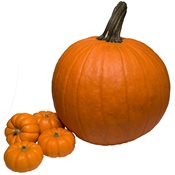 Pumpkins are cultivars of a squash plant, most commonly known scientifically as the Cucurbita pepo that is round, with smooth, slightly ribbed skin, and deep yellow to orange coloration. Pumpkins are jam packed with fiber, vitamin A, and flavonoid poly-phenolic antioxidants such as lutein, xanthine, and carotenes. Eating pumpkin is good for the heart as the potassium and vitamin C all support heart health. Consuming adequate potassium is almost as important as decreasing sodium intake for treatment of hypertension (high-blood pressure). Other foods that are high in potassium include cantaloupe, pineapple, tomatoes, oranges, spinach, and bananas. Increased potassium intakes are also associated with a reduced risk of stroke, protection against loss of muscle mass, preservation of bone mineral density and reduction in the formation of kidney stones.
Pumpkins are cultivars of a squash plant, most commonly known scientifically as the Cucurbita pepo that is round, with smooth, slightly ribbed skin, and deep yellow to orange coloration. Pumpkins are jam packed with fiber, vitamin A, and flavonoid poly-phenolic antioxidants such as lutein, xanthine, and carotenes. Eating pumpkin is good for the heart as the potassium and vitamin C all support heart health. Consuming adequate potassium is almost as important as decreasing sodium intake for treatment of hypertension (high-blood pressure). Other foods that are high in potassium include cantaloupe, pineapple, tomatoes, oranges, spinach, and bananas. Increased potassium intakes are also associated with a reduced risk of stroke, protection against loss of muscle mass, preservation of bone mineral density and reduction in the formation of kidney stones.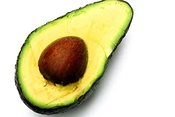 Avocados are often called the “alligator pear” and contain over 20 nutrients. According to the California Avocado Commission, avocados can actually help your body absorb the other nutrients in your food. They’re also loaded with polyunsaturated and monounsaturated fats, which deliver heart benefits among other things. Of note, when it comes to your cholesterol, avocadoes may actually help you lower your numbers.
Avocados are often called the “alligator pear” and contain over 20 nutrients. According to the California Avocado Commission, avocados can actually help your body absorb the other nutrients in your food. They’re also loaded with polyunsaturated and monounsaturated fats, which deliver heart benefits among other things. Of note, when it comes to your cholesterol, avocadoes may actually help you lower your numbers.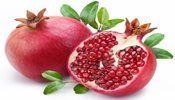 Pomegranates are round, red fruit with a “jewel-studded” interior. The name "pomegranate" derives from the Middle French "pomme garnete" – which literally means "seeded apple." Pomegranates are sometimes referred to as Chinese apples or the “Jewel of the Autumn.” Originating in Iran and India, the pomegranate dates back to ancient times. Many scholars believe that the forbidden, yet irresistible, fruit in which Eve indulged within the Garden of Eden was actually a pomegranate – and not an apple. You may have heard pomegranates referred to as a superfoods, as they are nutrient dense with fiber, Vitamin C and potassium. It is a unique food for kids.
Pomegranates are round, red fruit with a “jewel-studded” interior. The name "pomegranate" derives from the Middle French "pomme garnete" – which literally means "seeded apple." Pomegranates are sometimes referred to as Chinese apples or the “Jewel of the Autumn.” Originating in Iran and India, the pomegranate dates back to ancient times. Many scholars believe that the forbidden, yet irresistible, fruit in which Eve indulged within the Garden of Eden was actually a pomegranate – and not an apple. You may have heard pomegranates referred to as a superfoods, as they are nutrient dense with fiber, Vitamin C and potassium. It is a unique food for kids.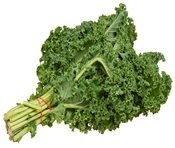 Kale is a leafy, dark green vegetable that is full of nutrients and flavor. Some types are purple. Kale is a cruciferous vegetable in the same family as broccoli, brussel sprouts, collard greens, cabbage and cauliflower. With its sulforaphane content, kale protects against prostate and colon cancers. It also has properties that studies show can ease lung congestion and can be beneficial to your stomach, liver, and immune system. Kale contains lutein and zeaxanthin, which help protect your eyes from macular degeneration.
Kale is a leafy, dark green vegetable that is full of nutrients and flavor. Some types are purple. Kale is a cruciferous vegetable in the same family as broccoli, brussel sprouts, collard greens, cabbage and cauliflower. With its sulforaphane content, kale protects against prostate and colon cancers. It also has properties that studies show can ease lung congestion and can be beneficial to your stomach, liver, and immune system. Kale contains lutein and zeaxanthin, which help protect your eyes from macular degeneration.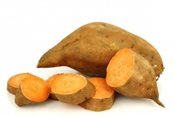 Sweet potatoes are high in fiber and one of the best sources of vitamin A; a large one contains more than 100 percent of the daily recommended intake, according to the U.S. Food and Drug Administration. Vitamin A is an antioxidant powerhouse, and is linked to anti-aging benefits, cancer prevention and the maintenance of good eyesight, according to the National Institutes of Health.
Sweet potatoes are high in fiber and one of the best sources of vitamin A; a large one contains more than 100 percent of the daily recommended intake, according to the U.S. Food and Drug Administration. Vitamin A is an antioxidant powerhouse, and is linked to anti-aging benefits, cancer prevention and the maintenance of good eyesight, according to the National Institutes of Health.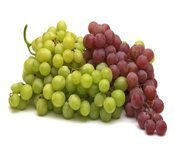 Grapes have been around for thousands of years. When they ripen, they turn translucent green, black, purple or red. Some have edible seeds. According to the California Table Grape Commission, numerous studies on grapes and grape products, including table grapes, grape juice and wine, suggest that grapes contribute to heart health. This benefit is typically attributed to the polyphenols present in the grape. Human studies have shown that eating a variety of grapes may help maintain a healthy heart by promoting the relaxation of blood vessels to help maintain healthy blood flow and function. Additionally, studies suggest that grapes impact other aspects of heart health as well.
Grapes have been around for thousands of years. When they ripen, they turn translucent green, black, purple or red. Some have edible seeds. According to the California Table Grape Commission, numerous studies on grapes and grape products, including table grapes, grape juice and wine, suggest that grapes contribute to heart health. This benefit is typically attributed to the polyphenols present in the grape. Human studies have shown that eating a variety of grapes may help maintain a healthy heart by promoting the relaxation of blood vessels to help maintain healthy blood flow and function. Additionally, studies suggest that grapes impact other aspects of heart health as well.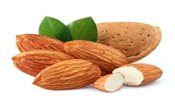 Almonds are an edible nutrient dense seed that grow on the tree Prunus dulcis, more commonly called the almond tree. Almonds are native to the Middle East, but the United States is now the world’s largest producer. The almonds that are bought in the store usually have the shell removed. Almonds are sold either raw (also called “natural”) or roasted. Most of the almond’s fat is monounsaturated. Almonds are excellent sources of plant-based protein, Vitamin E, manganese and magnesium. They are loaded with antioxidants and contain a fair amount of copper, riboflavin (vitamin B2), and phosphorus. Eating almonds can help reduce hunger and lower your overall caloric intake, so they may be helpful in weight loss.
Almonds are an edible nutrient dense seed that grow on the tree Prunus dulcis, more commonly called the almond tree. Almonds are native to the Middle East, but the United States is now the world’s largest producer. The almonds that are bought in the store usually have the shell removed. Almonds are sold either raw (also called “natural”) or roasted. Most of the almond’s fat is monounsaturated. Almonds are excellent sources of plant-based protein, Vitamin E, manganese and magnesium. They are loaded with antioxidants and contain a fair amount of copper, riboflavin (vitamin B2), and phosphorus. Eating almonds can help reduce hunger and lower your overall caloric intake, so they may be helpful in weight loss.Make sure you come join us on Oct. 21 in one of our hospitals cafeterias to taste some of these superfoods! And consider joining our efforts to create a healthier community. Do you have ideas of how Community can be more environmentally responsible or what your department can do to contribute to sustainability efforts? Do you want to be informed about current and upcoming green events? The Sustainability Value Analysis Team invites you to join the Green Champions email list by contacting Rhonda Hightower by email at RHightower@communitymedical.org
Carrie Der Garabedian, MBA, RD, CFPM
Director of Nutrition Services
Community Behavioral Health Center
Community Subacute & Transitional Care Center
California Academy of Nutrition & Dietetics’ Central Valley District President (2016-17)



